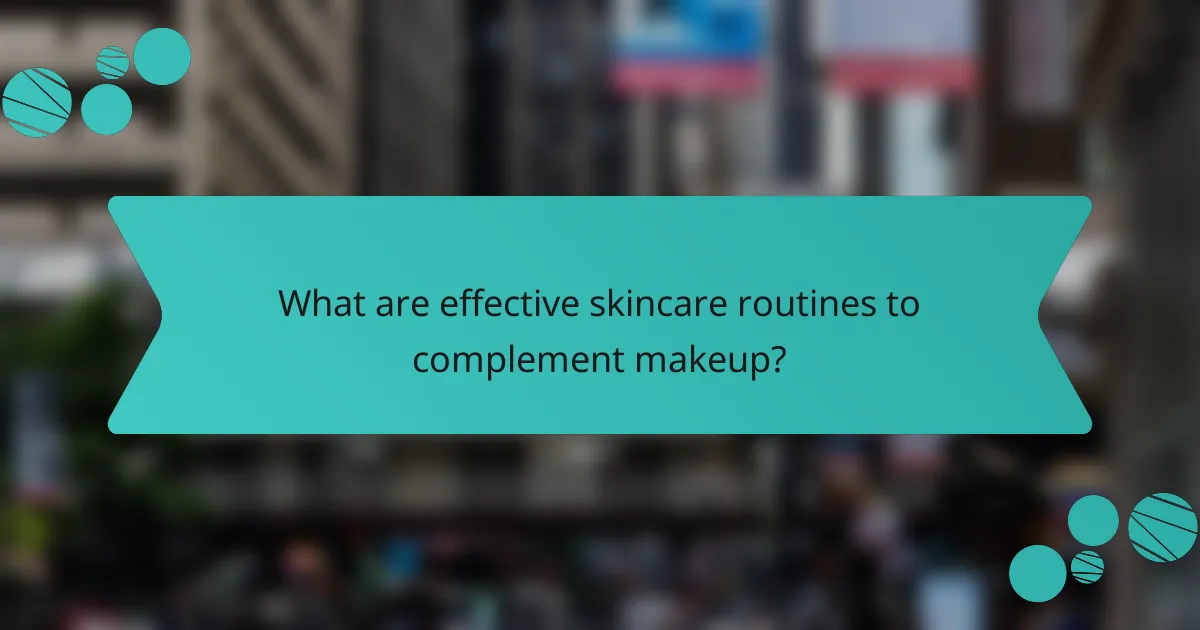Relying solely on makeup can mask skin imperfections but often leads to neglect of essential skin health practices. This dependency may result in irritation and long-term damage, ultimately undermining confidence rather than enhancing it. A balanced approach that includes effective skincare routines is crucial for maintaining healthy skin and achieving a natural, radiant appearance.

What are the risks of relying solely on makeup in the UK?
Relying solely on makeup can lead to various skin health issues, including irritation, long-term damage, and an increased dependency on cosmetic products. While makeup can enhance appearance, neglecting skin care can result in adverse effects that compromise overall skin health.
Skin irritation and breakouts
Frequent use of makeup can cause skin irritation and trigger breakouts, especially if products contain harsh chemicals or allergens. Ingredients like fragrances, parabens, and sulfates can exacerbate sensitive skin conditions, leading to redness and inflammation.
To minimize irritation, choose non-comedogenic and hypoallergenic products. Regularly cleanse your skin to remove makeup and prevent clogged pores, which can contribute to acne flare-ups.
Long-term skin damage
Over time, relying heavily on makeup without proper skin care can lead to long-term damage, such as premature aging and loss of elasticity. Makeup can create a barrier that prevents the skin from breathing, potentially leading to dryness and dullness.
Incorporating a daily skincare routine that includes cleansing, moisturizing, and sun protection can help mitigate these effects. Look for products with antioxidants and hydrating ingredients to support skin health.
Increased dependency on products
Relying solely on makeup can create a psychological dependency, where individuals feel unable to go without it. This reliance can diminish self-esteem and body image, as the perceived need for makeup overshadows natural beauty.
To combat this dependency, consider gradually reducing makeup use and focusing on enhancing your natural features through skincare. Embrace makeup-free days to build confidence in your skin’s appearance without products.

How can neglecting skin health affect confidence?
Neglecting skin health can significantly undermine confidence by creating a reliance on makeup to mask imperfections. This reliance often leads to a cycle of poor skin conditions, which can further diminish self-esteem and create a false sense of security.
False sense of security
Many individuals believe that makeup can completely cover skin issues, providing a false sense of security. While makeup can enhance appearance temporarily, it does not address underlying skin health problems such as acne, dryness, or irritation. Over time, this neglect can worsen skin conditions, making it harder to achieve a natural, healthy look.
Additionally, using heavy makeup regularly can lead to clogged pores and breakouts, creating a dependency on makeup to hide these issues. This cycle can trap individuals in a loop where they feel they must wear makeup to feel confident, even when it may be detrimental to their skin.
Impact on self-esteem
Relying solely on makeup can have a profound impact on self-esteem. When individuals feel they must hide their natural skin, they may develop insecurities about their appearance. This can lead to a negative self-image, where they equate their worth with their makeup application rather than their natural beauty.
Moreover, the constant need to apply makeup can become exhausting and time-consuming, leading to frustration and stress. Individuals may find themselves avoiding social situations or feeling anxious about their appearance, which can further erode confidence and hinder personal and professional interactions.

What are effective skincare routines to complement makeup?
Effective skincare routines that complement makeup include daily cleansing, moisturizing, and sun protection. These practices help maintain skin health, prevent damage, and enhance the overall appearance when makeup is applied.
Daily cleansing practices
Daily cleansing is essential for removing makeup, dirt, and excess oil from the skin. Use a gentle cleanser suited to your skin type, whether it’s oily, dry, or sensitive, to avoid irritation. Aim to cleanse your face twice a day, in the morning and before bed, to keep your pores clear.
Consider double cleansing in the evening, starting with an oil-based cleanser to dissolve makeup, followed by a water-based cleanser to remove any remaining impurities. This method ensures thorough cleansing without stripping the skin of its natural oils.
Moisturizing and hydration
Moisturizing is crucial for maintaining skin hydration and elasticity, especially when using makeup. Choose a moisturizer that matches your skin type; for oily skin, lightweight gel formulas work well, while cream-based moisturizers are better for dry skin. Apply moisturizer after cleansing to lock in moisture.
Incorporate hydrating serums containing ingredients like hyaluronic acid or glycerin for an extra boost. These can help plump the skin and create a smooth canvas for makeup application.
Sun protection strategies
Sun protection is vital to prevent skin damage and premature aging. Use a broad-spectrum sunscreen with an SPF of at least 30 daily, even on cloudy days. Apply it as the last step in your skincare routine, before makeup, to ensure adequate protection.
Consider using makeup products that contain SPF for added protection, but do not rely solely on them. Reapply sunscreen every two hours if you’re outdoors, especially if sweating or swimming, to maintain effective sun defense.

How can one choose the right makeup products?
Choosing the right makeup products involves understanding your skin type and selecting items that enhance your appearance without causing harm. Prioritizing skin health while selecting cosmetics can prevent potential damage and promote a natural look.
Understanding skin types
Identifying your skin type is essential for selecting suitable makeup products. Common skin types include oily, dry, combination, and sensitive. Each type has unique characteristics that influence how products interact with your skin.
For example, oily skin may benefit from matte foundations that control shine, while dry skin often requires hydrating formulas. Testing products on a small area of your skin can help determine compatibility before full application.
Choosing non-comedogenic products
Non-comedogenic products are formulated to avoid clogging pores, making them ideal for maintaining skin health. Look for labels that explicitly state “non-comedogenic,” especially if you are prone to acne or breakouts.
Common non-comedogenic ingredients include water-based formulations, certain oils like jojoba, and mineral-based products. Always check ingredient lists and consider patch testing new products to ensure they do not irritate your skin or cause adverse reactions.

What are the signs of skin health neglect?
Signs of skin health neglect can manifest in various ways, indicating that the skin is not receiving the care it needs. Common indicators include dryness, increased breakouts, and a dull complexion, all of which can lead to further skin issues if not addressed.
Dryness and flakiness
Dryness and flakiness are clear signs that the skin is not being properly hydrated or nourished. This can occur when makeup is used excessively without adequate skincare, leading to a compromised skin barrier. Over time, neglecting to moisturize can result in rough patches and irritation.
To combat dryness, incorporate a daily moisturizer suitable for your skin type. Look for ingredients like hyaluronic acid or glycerin, which help retain moisture. Avoid harsh cleansers that strip natural oils, and consider using a humidifier in dry environments to maintain skin hydration.
Increased acne and blemishes
Relying solely on makeup can contribute to increased acne and blemishes, as clogged pores and excess oil production often result from inadequate cleansing. Makeup can trap dirt and bacteria, leading to breakouts if the skin is not thoroughly cleaned at the end of the day.
To reduce acne, establish a consistent skincare routine that includes cleansing, exfoliating, and moisturizing. Use non-comedogenic products that won’t clog pores. Regularly changing pillowcases and avoiding touching your face can also help minimize the risk of breakouts.

What alternatives exist to enhance natural beauty?
To enhance natural beauty without relying solely on makeup, individuals can explore various skincare treatments and cosmetic procedures. These options can improve skin health and boost confidence by addressing underlying issues rather than just masking them.
Skincare treatments
Skincare treatments focus on improving the health and appearance of the skin through various methods. Common options include facials, chemical peels, and microdermabrasion, which can help exfoliate the skin, reduce blemishes, and promote a more radiant complexion.
When considering skincare treatments, it’s essential to choose products and services that suit your skin type. For example, those with sensitive skin may benefit from gentle, hydrating treatments, while oily skin types might find salicylic acid peels more effective. Always consult a dermatologist for personalized recommendations.
Cosmetic procedures
Cosmetic procedures offer more intensive options for enhancing natural beauty, including treatments like Botox, fillers, and laser therapy. These procedures can target specific concerns such as wrinkles, volume loss, or uneven skin tone, providing more immediate results compared to topical treatments.
Before undergoing any cosmetic procedure, research the options thoroughly and consider factors such as recovery time, potential side effects, and costs, which can vary widely. For instance, Botox sessions typically range from $300 to $600 per treatment, depending on the area treated and the provider’s expertise. Always choose a licensed professional to ensure safety and effectiveness.

How can lifestyle changes improve skin health?
Lifestyle changes can significantly enhance skin health by addressing underlying issues and promoting a balanced approach to skincare. Incorporating healthy habits into your daily routine can lead to clearer, more vibrant skin while reducing reliance on makeup.
Dietary adjustments
Making dietary adjustments is crucial for improving skin health. A balanced diet rich in vitamins, minerals, and antioxidants can help nourish the skin from within. Focus on incorporating a variety of fruits, vegetables, whole grains, and healthy fats into your meals.
Consider foods high in omega-3 fatty acids, such as salmon, walnuts, and flaxseeds, which can help reduce inflammation and improve skin elasticity. Additionally, staying hydrated by drinking plenty of water is essential for maintaining skin moisture and overall health.
Avoid excessive sugar and processed foods, as they can lead to breakouts and dull skin. Aim for a diet that includes a rainbow of colors to ensure you’re getting a wide range of nutrients that support skin vitality.
